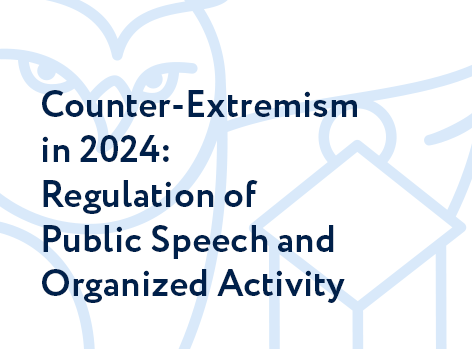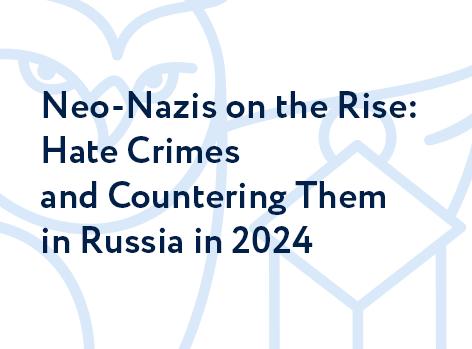In March 2019, SOVA Center learned about two attacks motivated by hate: in Voronezh and Yakutsk. Mass riots “with ethnic overtones” caused a media outcry in Yakutsk, where the rape of a woman provoked a series of threats against migrants and smashing vegetable stands run by them.
In total since the start of year, one has been killed and at least eight assaulted in five regions due to nationally or ideologically motivated violence.
In March we learned about the desecration of the grave of a 19th century Jewish Rabbi and spiritual leader, Israel Salanter, at a Jewish cemetery in Kaliningrad and about the broken standing cross at the Tatar hill-fort in Stavropol. These are the only known acts of vandalism since the start of the year.
Two events attended by Russian nationalists in March are worth mentioning. On March 17, the organizing committee formed after the rally against the alleged return of the Kuril Islands to Japan arranged an action at Suvorov Square in Moscow. The meeting got permission from the authorities and was attended by nearly thousand participants. The resolution was read out by Igor Strelkov, the Novorossiya movement leader. Furthermore, several groups of nationalists took part in the rally against the Russian Internet-isolation bill.
In March we learned about two convictions for racially motived violence. Both convictions were passed in St Petersburg. Among those sentenced was a member of the neo-Nazi group Lincoln‑88, Sergei Katkov, who was sentenced to nine years’ imprisonment for murder and several attacks against people with a “non-Slavic appearance.” In total since the start of the year, three convictions have been made against four people for violent crimes in which hatred was recognized as the motive in Moscow and St Petersburg.
In March, four convictions for xenophobic statements were issued against four people in four Russian regions. Two convictions were made under Article 205.2 of the Criminal Code (justification of terrorism) and two under Article 280 (public calls for extremist activity). The sentences under Article 205.2 were made in one case for calls to go to Syria and join armed groups and in the other, for calls to blow up the Federal Security Service (FSB) building. We have got no information on the grounds for the charges brought under Article 280.
In total since the start of the year, at least 29 convictions for racist and other agitation have been made against 33 people in 17 regions, not counting the convictions we consider obviously inappropriate.
Due to the partial decriminalization of Article 282 of the Criminal Code (incitement of hatred), three more cases were closed by courts “due to lack of evidence of a crime” and one case was dismissed by the investigation. Four convictions made earlier were lifted and the convicted were exempt from serving the sentences. The most famous of the released convicts was the former leader of the banned ultra-right-wing movement People’s Socialist Initiative (NSI), Dmitry (Schulz) Bobrov.
The Federal List of Extremist Materials was updated twice in March, on March 13 and 14. Items 4853-4868 were added to the list, including an anti-Semitic book by Nazi philosopher Hans Alfred Grunsky; the latest works of former head of the State Committee on Press, Boris Mironov, who wrote a number of anti-Semitic books; a collection of poems by radical right-wing poet Nikolai Bogolyubov; the books of Russian Orthodox fundamentalists and neo-pagans; books from the closed Library of Ukrainian Literature; numerous xenophobic video clips from social networks; and also a book by a Christian author criticizing Islam.
We found out that at least 23 people were fined in March according to Article 20.29 of the Code of Administrative Offenses (the production and distribution of banned materials). They were punished for sharing on social networks of songs popular among the ultra-right-wing groups; an anti-Semitic neopagan film called Games of the Gods; and songs by the bard of armed Chechen resistance, Timur Mutsuraev.
No fewer than 14 people were fined according to Article 20.3 of the Code of Administrative Offences (propaganda and public demonstration of Nazi and other banned organizations’ symbols). The majority were punished for the publication of images with Nazi and other banned groups’ symbols on the VKontakte social network. Only in one case was a Nazi symbol demonstrated offline: in Irkutsk, a drunk man went down a children’s slide and danced in the school yard, then drew a swastika on his forehead and chest with a marker and then proceeded to enter the school, where he showed the drawings to everyone.
We learned about eight punishments under a new article in the Code of Administrative Offenses, Article 20.3.1 (incitement to hatred), which corresponds with Part 1 of Article 282 of the Criminal Code in various Russian regions. Seven were fined, one arrested for three days, and another sentenced to community service for the publication on social networks of xenophobic videos, audio files, and other materials.
Our data on criminal and administrative cases are presented without account of courts decisions that we consider as clearly arbitrary. Unfortunately, our quantitative data, especially those concerning the prosecutions under the Code of Administrative Offenses, are quite incomplete.




